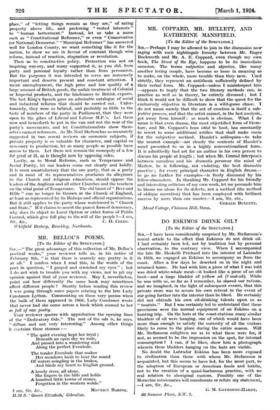MR. COPPARD, MR. BULLETT, AND KATHERINE MANSFIELD. [To the Editor
of the SPECTATOR.]
SIR,—Perhaps I may be allowed to join in the discussion now raging with such nightingale ferocity between Mr. Roger Buckworth and Mr. A. E. Coppard, even though my own book, The Street of the Eye, happens to be its immediate occasion. The terms subjective and objective, like many another loving couple, have become so loose in meaning as to make, on the whole, more trouble than they save. Used strictly, they represent an antithesis sufficiently defined by their verbal form. Mr. Coppard—unless I misinterpret him —appears to imply that the two literary methods can, in practice as well as in theory, be entirely divorced ; but I think it would not be difficult to show that the quest for the exclusively objective in literature is a wild-goose chase. I do not mean merely that the act of creation is itself a sub- jective process, and that the artist cannot, in the last analysis, get away from himself : so much is obvious. What I do mean is that even drama, the most objectified form of litera- ture, and Mr. Coppard's beau ideal to boot, has constantly to resort to some additional artifice that shall make room for the subjective method. Hamlet's soliloquies—to take the nearest example—are clearly the contents of Hamlet's mind presented to us in a highly conventionalized form. It is admittedly bad art for an author in his own person to discuss his people at length ; but when Mr. Conrad interposes between ourselves and his dramatis personae the mind of Marlow, he is following, not violating, the best dramatic practice ; for every principal character in English drama— to go no further for examples—is freely discussed by his fellow-characters. In thanking Mr. Coppard for his friendly and interesting criticism of my own work, let me persuade 'him to blame me alone for its defects, not a method (the method of oblique narration) that has been employed with brilliant success by more than one master.—I am, Sir, etc.,










































 Previous page
Previous page